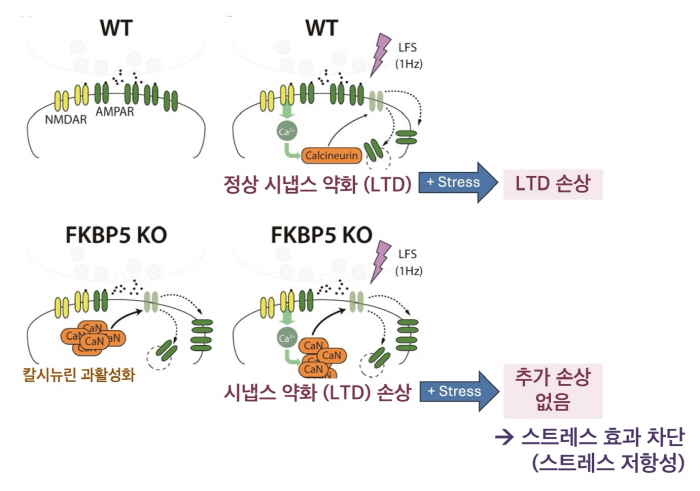Stress Resilience Finds Clues in the Brain...Specific proteins play a key role in regulating flexible adaptive responses
Jul 14, 2025
|
This is the result of the research team of Professor Jeong Ji-hye of Konkuk University (Life Science Characteristics Department), Professor Han Jung-soo (Life Science Characteristics Department), and Professor Park Ho-yong (KU Neuroscience Research Institute) published online on June 25 in the international journal 『Progress in Neurobiology" in the field of neuroscience.
The research team identified specific mechanisms for how protein FKBP5, which is involved in regulating stress hormone receptors, affects synaptic function in the brain hippocampus. FKBP5 is a protein that regulates the receptor of glucocorticoids, a stress hormone, whose function varies according to genetic mutations and is also known to be related to the risk of mental illness.
The research team analyzed the brains of mice (FKBP5 KO) with the FKBP5 gene removed and confirmed that the process of synapse strengthening (LTP) in the hippocampus area that controls memory and emotion remained relatively normal, but the process of synapse weakening (LTD) did not occur normally.
In animal models with the FKBP5 gene removed, the most striking behavioral feature was high resilience to stress. Even in stressful situations, little depressive behavior appeared.
Studies have shown that the dephosphorylase calcineurin, which is important for intracellular signaling, was overactivated in FKBP5-deficient mice, and this overactivation is responsible for the damage to LTD. Indeed, upon inhibition of calcineurin activity, the LTD function was also restored in FKBP5-deficient mice.
In particular, it was further found that mice with FKBP5 removed did not experience additional damage to their LTD function even after stress. In other words, there was no difference in the neurophysiological response of the hippocampus in both before and after stress, which explains that FKBP5 deficiency serves as an important basis for regulating the physiological response to stress.
The study demonstrated that FKBP5 is directly involved in the synaptic weakening process by controlling the degree of phosphorylation of certain proteins through the activity of calcineurin, and as a result, it can influence resilience to stress. In other words, it suggests that FKBP5 functions as a key molecular regulator regulating the brain's flexible adaptive response beyond simple stress response proteins.
Professor Jeong Ji-hye said, `A study that provided clues to explain the difference between those who overcome stress well and those who did not' at the brain level could also serve as a practical basis for the prevention and treatment of mental illness.'
This article was translated by Naver AI translator.














